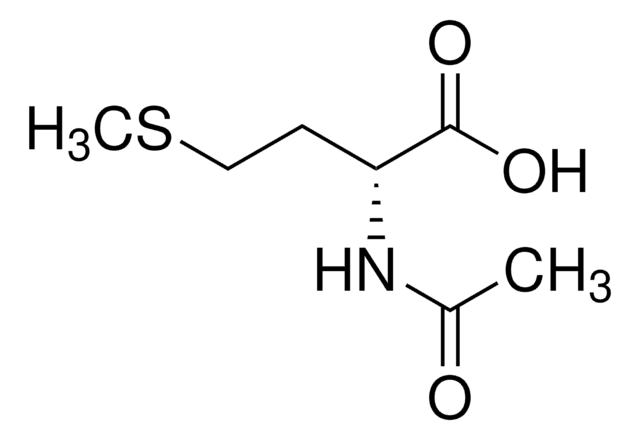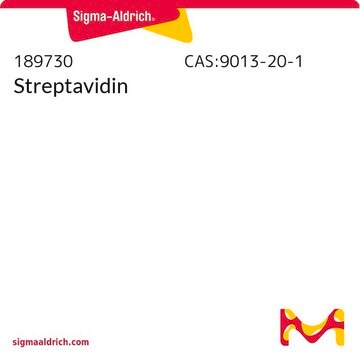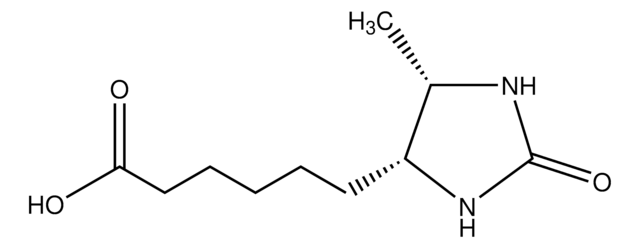A9275
Avidin from egg white
BioUltra, lyophilized powder, ≥10 units/mg protein (E1%/280), ≥98% (SDS-PAGE)
Sign Into View Organizational & Contract Pricing
All Photos(1)
About This Item
Recommended Products
biological source
egg white
Quality Level
product line
BioUltra
Assay
≥98% (SDS-PAGE)
form
lyophilized powder
specific activity
≥10 units/mg protein (E1%/280)
mol wt
glycoprotein 66 kDa
subunit 16 kDa
storage temp.
2-8°C
Looking for similar products? Visit Product Comparison Guide
Related Categories
General description
Avidin protein is a homotetrameric protein (68kDa) that is obtained from egg whites. This egg protein binds strongly to biotin. Thus, avidin-biotin association has been utilized in immunoassays to detect the localization of antigens in tissues. The use of avidin-biotin immunoassay enhances the sensitivity of the technique and facilitates the detection of antigens in low quantities.
Application
Avidin egg white was used in an assay using functionalized xenon as a biosensor to detect biotin-avidin binding. Egg white was used at 80 nmol.
Egg white avidin has been used as a cross-linker for biotin-conjugated antibodies. The product has also been used as a blocking agent in ELISA applications.
Unit Definition
One unit will bind 1.0 μg of d-biotin.
Preparation Note
Affinity purified
Disclaimer
Unless otherwise stated in our catalog or other company documentation accompanying the product(s), our products are intended for research use only and are not to be used for any other purpose, which includes but is not limited to, unauthorized commercial uses, in vitro diagnostic uses, ex vivo or in vivo therapeutic uses or any type of consumption or application to humans or animals.
Storage Class Code
11 - Combustible Solids
WGK
WGK 3
Flash Point(F)
Not applicable
Flash Point(C)
Not applicable
Personal Protective Equipment
dust mask type N95 (US), Eyeshields, Gloves
Choose from one of the most recent versions:
Certificates of Analysis (COA)
Lot/Batch Number
Don't see the Right Version?
If you require a particular version, you can look up a specific certificate by the Lot or Batch number.
Already Own This Product?
Find documentation for the products that you have recently purchased in the Document Library.
Lee B Sims et al.
Investigative ophthalmology & visual science, 60(5), 1696-1705 (2019-04-23)
The goal of this work was to design and assess the ability of unmodified and surface-modified poly(lactic-co-glycolic acid) (PLGA) nanoparticles (NPs) to enhance cell association, provide efficacy in retinoblastoma cells, and overcome current administration challenges, including hydrolysis and precipitation, of
Lee B Sims et al.
Journal of nanobiotechnology, 15(1), 67-67 (2017-10-07)
Advanced stage cancer treatments are often invasive and painful-typically comprised of surgery, chemotherapy, and/or radiation treatment. Low transport efficiency during systemic chemotherapy may require high chemotherapeutic doses to effectively target cancerous tissue, resulting in systemic toxicity. Nanotherapeutic platforms have been
Q Wang et al.
The American journal of physiology, 275(5 Pt 2), R1584-R1592 (1998-10-29)
We examined the effect of endotoxemia in mice on protein and mRNA levels for the acute phase proteins complement C3 and serum amyloid A (SAA) in jejunal mucosa. Endotoxemia was induced in mice by the subcutaneous injection of 250 microg
Roland Hager et al.
Small (Weinheim an der Bergstrasse, Germany), 12(21), 2877-2884 (2016-04-12)
The biofunctionalization of nanopatterned surfaces with DNA origami nanostructures is an important topic in nanobiotechnology. An unexplored challenge is, however, to co-immobilize proteins with DNA origami at pre-determined substrate sites in high contrast relative to the nontarget areas. The immobilization
B Steiniger et al.
The American journal of pathology, 159(2), 501-512 (2001-08-04)
We investigate the white pulp compartments of 73 human spleens and demonstrate that there are several microanatomical peculiarities in man that do not occur in rats or mice. Humans lack a marginal sinus separating the marginal zone (MZ) from the
Our team of scientists has experience in all areas of research including Life Science, Material Science, Chemical Synthesis, Chromatography, Analytical and many others.
Contact Technical Service







